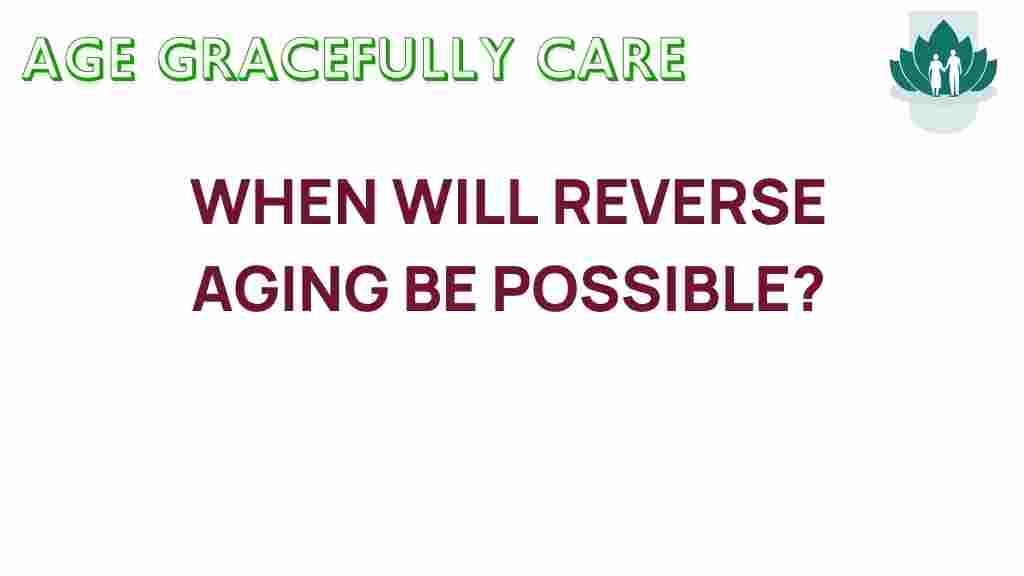The Quest for Reverse Aging: When Will It Become Reality?
The concept of reverse aging has captivated humanity for centuries. With advancements in biotechnology and medical research, the dream of rejuvenation and extending human longevity is inching closer to reality. This article will explore the latest breakthroughs in the field, the science behind aging, and what the future may hold for those seeking to defy the natural aging process.
Understanding the Science of Aging
Aging is a complex biological process characterized by a gradual decline in physiological function, increased vulnerability to disease, and ultimately, death. Scientists have identified several key mechanisms that contribute to aging, including:
- Telomere shortening: Telomeres are protective caps at the ends of chromosomes that shorten with each cell division, leading to cellular aging.
- Cellular senescence: Cells lose their ability to divide and function properly over time, contributing to tissue dysfunction.
- Oxidative stress: An accumulation of free radicals can damage cells and accelerate aging.
- Inflammation: Chronic inflammation is linked to various age-related diseases.
Understanding these mechanisms allows researchers to develop strategies for rejuvenation and anti-aging interventions.
Breakthroughs in Reverse Aging Technologies
In recent years, there have been significant breakthroughs in the field of reverse aging. Here are some of the most notable advancements:
1. Telomerase Activation
Telomerase is an enzyme that can extend the length of telomeres, potentially delaying the aging process. Research has shown that activating telomerase in cells can promote cellular division and rejuvenation. Companies like Telomere Diagnostics are investigating ways to harness this technology for health benefits.
2. Senolytics
Senolytic drugs target and eliminate senescent cells, which accumulate with age and contribute to various diseases. Recent studies have demonstrated that removing these cells can improve health and extend lifespan in animal models. This area of research is rapidly evolving, with clinical trials underway.
3. Gene Therapy
Advancements in gene therapy have opened new avenues for longevity research. By modifying genes associated with aging, researchers aim to enhance cellular repair mechanisms and promote healthier aging. Notable projects include the use of CRISPR technology to edit genes related to age-related diseases.
4. Stem Cell Therapy
Stem cells have the unique ability to differentiate into various cell types, making them invaluable for regenerative medicine. Researchers are exploring the use of stem cells to repair or replace damaged tissues in aging individuals. Clinical applications are already being tested in areas like cardiovascular health and neurodegenerative diseases.
5. Nutritional Interventions
Diet plays a crucial role in aging and longevity. Caloric restriction and specific dietary patterns, such as the Mediterranean diet, have been linked to extended lifespan and improved health. Supplements like NAD+ precursors and antioxidants are also being investigated for their potential to combat aging at the biochemical level.
The Role of Biotechnology in Reverse Aging
Biotechnology is at the forefront of the quest for reverse aging. By harnessing biological processes and manipulating them for therapeutic applications, researchers are uncovering new ways to enhance health and extend lifespan. Here are some key areas where biotechnology is making an impact:
- Biomarkers of Aging: Identifying and measuring biological markers can help determine an individual’s biological age versus chronological age, guiding personalized interventions.
- Regenerative Medicine: Techniques such as tissue engineering and organ regeneration are being developed to replace damaged or aged tissues.
- Personalized Medicine: Tailoring treatments based on genetic and epigenetic profiles can optimize therapeutic outcomes for anti-aging strategies.
Challenges and Ethical Considerations
Despite the promising advancements, the quest for reverse aging is fraught with challenges:
- Safety and Efficacy: Many anti-aging interventions are still in experimental stages, and their long-term effects are unknown.
- Accessibility: Advanced therapies may not be affordable or accessible to everyone, raising concerns about inequalities in healthcare.
- Ethical Dilemmas: The possibility of significantly extending human lifespan raises questions about overpopulation, resource allocation, and the societal implications of a longer life.
Practical Steps Toward Rejuvenation
While the science of reverse aging is still developing, individuals can take actionable steps to promote healthy aging and potentially extend their lifespan:
1. Adopt a Healthy Lifestyle
Engaging in regular physical activity, maintaining a balanced diet rich in fruits and vegetables, and managing stress can significantly impact overall health and longevity.
2. Stay Informed About Research
Keeping up with the latest breakthroughs in biotechnology and medical research can empower individuals to make informed decisions about their health. Follow reputable sources and consider participating in clinical trials, if eligible.
3. Consider Nutritional Supplements
While more research is needed, some supplements, such as resveratrol, curcumin, and NAD+ boosters, show promise in supporting cellular health. Always consult with a healthcare professional before starting any new supplement regimen.
4. Embrace Mental Well-being
Mental health is just as crucial as physical health. Engage in activities that promote cognitive function, such as reading, puzzles, and social interaction. Practices like meditation can also reduce stress and improve overall well-being.
Troubleshooting Tips for Healthy Aging
As you embark on your journey toward healthy aging, consider these troubleshooting tips:
- Regular Health Check-ups: Stay proactive about your health by scheduling regular check-ups with your healthcare provider.
- Consult Experts: Seek advice from specialists in nutrition, fitness, and gerontology for personalized recommendations.
- Monitor Your Progress: Keep track of your lifestyle changes and their impacts on your health. Adjust your strategies as needed.
Conclusion
The quest for reverse aging is an exciting frontier in science and medicine. With ongoing research in biotechnology and innovative breakthroughs, the potential for rejuvenation and enhanced longevity is becoming increasingly tangible. While challenges and ethical considerations remain, individuals can take proactive steps to promote their health and well-being.
As we continue to unlock the secrets of aging, the dream of a longer, healthier life may soon transition from fantasy to reality. Stay informed, stay healthy, and embrace the future of anti-aging science.
For more information on the latest research in longevity, visit National Institute on Aging.
This article is in the category Health and created by AgeGracefullyCare Team
